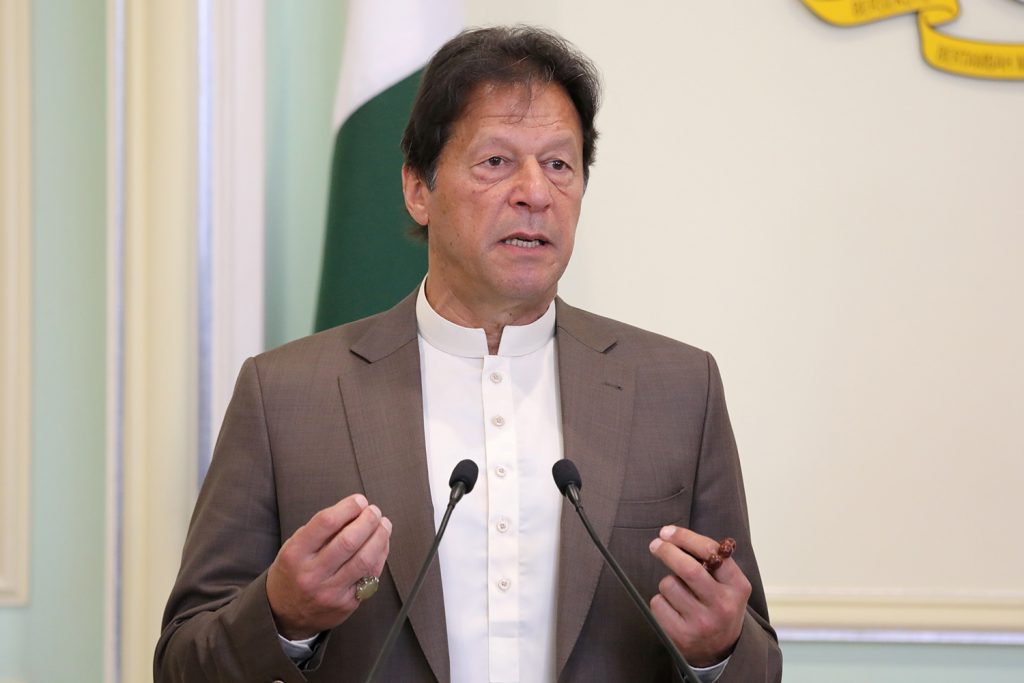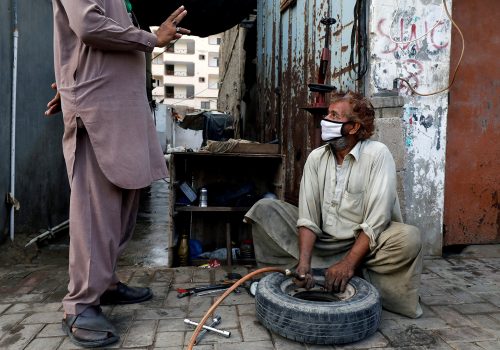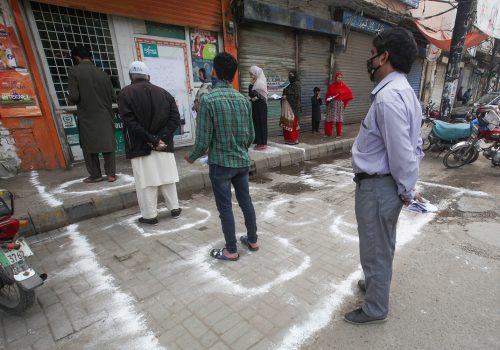The Pakistani Senate is racing to approve multiple bills to prevent money laundering and terrorist financing—and fulfill a twenty-seven-point plan from global watchdog Financial Action Task Force (FATF). With thirteen remaining conditions and an eye on the mid-October deadline, Pakistan is hoping to avoid a demotion from the FATF’s grey list to the blacklist, joining countries such as Iran and North Korea.
Placed on the grey list in June of 2018, if Pakistan does not meet the criteria laid out by the FATF, it could fall to the blacklist, potentially being unable to receive financial assistance from the World Bank, the International Monetary Fund (IMF), the Asian Development Bank (ADB), and several other international organizations.
Over the last two years, Pakistan has made progress by fulfilling fourteen of the criteria required by the FATF, such as developing an integrated database at airports for enhanced coordination across financial, administrative, and law enforcement agencies, and establishing successful outreach and regulatory safeguards aimed at countering terrorist financing within the country’s financial sector.
Pakistan was originally placed on the grey list in 2018 due to its failure to comply with requirements such as regulating money laundering and combatting the financing of terrorism. The FATF found that Pakistan lacks the necessary mechanisms to ensure that taxpayer money is not going to terrorist organizations, and that Islamabad was unable to monitor cashflow to these groups. In many ways, the FATF extending Pakistan’s original compliance deadline by six months due to the COVID-19 pandemic gives the government some much-needed breathing room to implement additional reforms.
To leverage the opportunity presented by the extended deadline, the Pakistani government needs to be able to cooperate with other governments to counteract terrorist financing and other organizations banned by FATF, and Pakistan must be able to demonstrate financial transparency and a clear system for financial transactions in order to evade prohibitions on business.
It’s not all bad news. In a positive move, the Pakistani Senate unanimously approved two bills on July 30; The United Nations Security Council Amendment Bill and the Anti-Terrorism Act Amendment. Additionally, late last week, five other bills related to complying with FATF travelled from the Pakistani Senate to committees within Parliament for further deliberation, including the Islamabad Capital Territory Trust Bill and the Limited Liability Partnership (Amendment) Bill. As Pakistan’s government continues toward the finish line to reach FATF’s guidelines, the country needs to be able to demonstrate effectiveness in a multitude of areas, such as taking action against illegal money or value transfer services (MVTS), transforming madrassas into schools and health units into official establishments, cutting off funding to banned organizations, and much more.
Given outcry from the opposition, this has not been an easy task for Pakistani Prime Minister Imran Khan’s PTI government, even as Pakistan seems to make a good faith effort to comply with outstanding FATF requirements.
Pakistan’s status on the FATF grey list inevitably impacts the country’s ability to attract foreign investors. This is incredibly important in the current economic climate of the pandemic where there are serious barriers to economic growth globally. Generally, Pakistan’s grey list status could impact imports, exports, remittances, and its ability to borrow money from international lenders, such as the IMF and the ADB. However, more specifically, COVID-19 has forced businesses to support remittances, e-commerce, and online systems in a way that business models were not prepared for. Globally, businesses have been forced to rely less on in-person operations and have had to adapt and develop an online presence, relying on digital services.
However, digital offerings require mechanisms that support fraud protection, anti-money laundering, and counterterrorism efforts. Therefore, industries which rely on online payment systems and online money transfers may be hesitant to invest in Pakistan due to its FATF grey list status. If Pakistan cannot make the necessary reforms for FATF compliance, it will be hard-pressed to convince the international community that it can and will make necessary reforms for investors. This remains a serious impediment for Pakistan’s business climate as well as the growth of its e-commerce and digital finance sector.
As usual, an additional complicating factor for Pakistan is its eastern neighbor, India. Pakistan has long claimed that India has politicized Pakistan’s inability to comply with FATF requirements and that the Indian government has raised this issue in multilateral fora to push for economic sanctions. This claim is not completely unsubstantiated: India may claim that they have suffered from Pakistani-funded terrorism in the upcoming FATF plenary session in October 2020. Rightly so, India could choose to highlight Pakistan’s alleged inaction on curbing terrorist financing by showcasing evidence from the recent Pulwama attack and the 2011 Mumbai attacks.
It is unlikely in India’s or the world’s best interest to push Pakistan towards the FATF blacklist. It is important to note that the lists themselves are not the goal; remediation is the goal. And if Pakistan has effectively satisfied the remaining FATF requirements and meets international compliance goals through legislation, they deserve to be in the clear.
Safiya Ghori-Ahmad is a nonresident senior fellow at the Atlantic Council’s South Asia Center, and serves as the South Asia Director at McLarty Associates.
Further reading:
Image: Pakistan's Prime Minister Imran Khan speaks at a news conference in Putrajaya, Malaysia, February 4, 2020. REUTERS/Lim Huey Teng/File Photo



